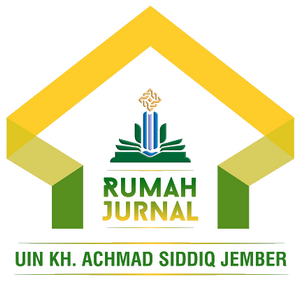Harmony in Schools: Exploring the Impact of the Peaceful Schools Program in Building Tolerance and Peace
DOI:
https://doi.org/10.35719/ijibs.v2i2.45This research explores the implementation and impact of the Peaceful School Program managed by the Wahid Foundation in several Senior High Schools (SMA) in Indonesia. The research method used is a qualitative descriptive case study approach, with a focus on an in-depth understanding of how this program is implemented in specific schools and how it impacts students, teachers and the school environment as a whole. The results of this research reveal how the Peaceful Schools Program has created a more inclusive educational environment and encouraged a better understanding of the values of tolerance, peace and inclusion among students. Yenny Wahid as Director of the Wahid Foundation, the Peaceful Schools Program is an initiative that was born in response to the results of a survey on socio-religious tolerance trends conducted by the Wahid Foundation in 2016. In 2018, the Wahid Foundation reported that the Peaceful Schools program had been implemented in several high schools/vocational schools in provinces such as DKI Jakarta, West Java, East Java and Central Java. In Central Java Province, there are already 5 schools implementing the Peace School program, namely SMAN 7 Semarang, SMAN 10 Semarang, SMAN 11 Semarang, SMAN 13 Semarang, and SMAN 1 Cepiring Kendal. To date, the Peace School has been implemented in 79 Senior High and Vocational Schools (SMA/SMK) in the region. Good cooperation between Indonesia and Australia, through AIPJ2, has contributed to the success of the Peaceful Schools initiative in promoting tolerance and peace in the educational context in Indonesia.
References
Achsin, M, Seniwati Seniwati, R Effendi, Triyanto Triyanto, M Bello, N Ninggara, S Rafifah, and S Gularso. “The Role of Non-Governmental Organization in Preventing Violent Extremism in Indonesia: The Case of Wahid Foundation.” In Proceedings of the Proceedings of the First Brawijaya International Conference on Social and Political Sciences, BSPACE, 26-28 November, 2019, Malang, East Java, Indonesia. Malang, Indonesia: EAI, 2020. https://doi.org/10.4108/eai.26-11-2019.2295216.
Affan, Faisal. “Wahid Foundation Perkenalkan Buku Sekolah Damai Untuk Mengajarkan Siswa Bertoleransi,” 2023. https://jateng.tribunnews.com/2022/02/25/wahid-foundation-perkenalkan-buku-sekolah-damai-untuk-mengajarkan-siswa-bertoleransi?page=2.
Aqil, Muhammad. “Nilai-Nilai Humanisme Dalam Dialog Antar Agama Perspektif Gus Dur.” Al-Adyan: Journal of Religious Studies 1, no. 1 (2020): 52–66.
Ayunur, BATASSYA. “Implementasi Kerjasama Wahid Foundation Dan UN Women Dalam Pemberdayaan Perempuan Di Indonesia Melalui Program Peace Village.” Universitas Pembangunan Nasional “Veteran” Jakarta, 2020.
Bakry, Umar Suryadi. “Pemanfaatan Metode Etnografi Dan Netnografi Dalam Penelitian Hubungan Internasional.” Jurnal Global & Strategis 11, no. 1 (2017): 15.
Farid, Muhammad, and M. Sos. Fenomenologi: Dalam Penelitian Ilmu Sosial. Prenada Media, 2018.
Farikhatin, Nuri. “Wahid Foundation Luncurkan Sekolah Damai Di Jawa Tengah,” 2023. https://www.nu.or.id/nasional/wahid-foundation-luncurkan-sekolah-damai-di-jawa-tengah-jlDxV.
Firdaus M, Yunus. “Konflik Agama Di Indonesia Problem Dan Solusi Pemecahannya.” Substantia 16, no. 2 (2014). https://doi.org/DOI: http://dx.doi.org/10.22373/substantia.v16i2.4930.
Gaffar, Abdul. “Potret Pemikiran Kh. Abdurrahman Wahid (Studi Terhadap Buku Biografi Gus Dur: The Authorized Biography Of Abdurrahman Wahid Karya Greg Barton Dan Buku Ijtihad Politik Gus Dur Karya Munawar Ahmad).” Uin Sunan Kalijaga Yogyakarta, 2011.
Karlita, Nina. “Wahid Foundation Dan Japan Tobacco International Indonesia Kembangkan Desa Damai Di Banyuwangi,” 2023. https://www.industry.co.id/read/122092/wahid-foundation-dan-japan-tobacco-international-indonesia-kembangkan-desa-damai-di-banyuwangi.
Khaerun Rijaal, M. Ardini. “Fenomena Intoleransi Antar Umat Beragama Serta Peran Sosial Media Akun Instagram Jaringan Gusdurian Indonesia Dalam Menyampaikan Pesan Toleransi.” Syiar | Jurnal Komunikasi Dan Penyiaran Islam 1, no. 2 (December 5, 2021): 103–32. https://doi.org/10.54150/syiar.v1i2.41.
Kuswarno, Engkus. “Tradisi Fenomenologi Pada Penelitian Komunikasi Kualitatif: Sebuah Pengalaman Akademis.” MediaTor (Jurnal Komunikasi) 7, no. 1 (2006): 47–58.
Marbawi, Mahnan, Setiyo Iswoyo, Husni Mubarok, and Alamsyah M Dja’far. “MENCIPTA GENERASI PENJAGA KEBHINEKAAN “Panduan Sekolah Damai, Konsep Dan Indikator,.” Jakarta: WAHID FOUNDATION, 2019.
Mursalat. “Nahdlatul Ulama (Nu) Female Figures In The Modern Era: Yenny Wahid’s Gait As A Woman Warrior In Humanity And Peace.” Mimikiri 9, no. 1 (2023).
Nurhadi, Irfan. “Membangun Budaya Damai Di Sekolah : Analisis Program Sekolah Damai Wahid Foundation,” n.d.
Nuryana, Arief, Pawito Pawito, and Prahastiwi Utari. “Pengantar Metode Penelitian Kepada Suatu Pengertian Yang Mendalam Mengenai Konsep Fenomenologi.” Ensains Journal 2, no. 1 (2019): 19–24.
Otang, Andriko Sugianto. “Panduan Pemantauan, Evaluasi Dan Pembelajaran (MEL).” Jakarta: International Labour Organization, 2022.
Santoso, Gunawan, Annisa Damayanti, Ma’mun Murod, Susilahati, Sri Imawati, and Masduki Asbari. “Implementasi Kurikulum Merdeka Melalui Literasi Proyek Penguatan Profil Pelajar Pancasila. Jurnal Pendidikan Transformatif.” Jurnal Pendidikan Transformatif 2, no. 1 (2023).
Santoso, Gunawan, and Mamun Murod. “Comparison of the Contents Pancasila Education and Citizenship From 1975-2013 Curriculum in Indonesian at The 21st Century.” Jurnal Ekonomi 21, no. 2 (December 31, 2021): 65–71. https://doi.org/10.29138/je.v21i2.148.
Suaedy, Ahmad. Gus Dur: Islam Nusantara & Kewarganegaraan Bineka. Gramedia Pustaka Utama, 2018.
Susilawati, Susilawati. “Pemberdayaan Perempuan Di Kampung Damai: Studi Pendampingan Komunitas Oleh Wahid Foundation Di Gemlegan Klaten.” Jurnal Pemberdayaan Masyarakat: Media Pemikiran Dan Dakwah Pembangunan 2, no. 2 (2019): 425–46.
Sutisna, Usman. “Model Penguatan Pesan Damai Ala Wahid Foundation Bagi Pendidikan Karakter Pemuda Muslim Jakarta Pusat.” SAP (Susunan Artikel Pendidikan) 6, no. 2 (2021).
———. “Model Penguatan Pesan Damai Ala Wahid Foundation bagi Pendidikan Karakter Pemuda Muslim Jakarta Pusat.” SAP (Susunan Artikel Pendidikan) 6, no. 2 (December 5, 2021). https://doi.org/10.30998/sap.v6i2.9203.
Wahid, Yenny Zannuba, Ahmad Suaedy, Anita Hayatunnufus Rahman, Mohammed Subhi Azhari, Nurun Nisa, Alamsyah Dja’far, and Badrus Samsul Fata. “Laporan Kebebasan Beragama/Berkeyakinan Dan Toleransi The Wahid Institute Tahun 2010.” The WAHID Institute, n.d.
Downloads
Published
Issue
Section
License
Copyright (c) 2024 Siswoyo Aris Munandar, Fahrurrozi

This work is licensed under a Creative Commons Attribution-NonCommercial 4.0 International License.
License
1. Author’s Warranties
The author warrants that the article is original, written by stated author/s, has not been published before, contains no unlawful statements, does not infringe the rights of others, is subject to copyright that is vested exclusively in the author and free of any third party rights, and that any necessary written permissions to quote from other sources have been obtained by the author(s).
2. Miscellaneous
IJIBS will publish the article (or have it published) in the journal if its editorial process is successfully completed and IJIBS or its sublicensee has become obligated to publish it. IJIBS may conform the article to a style of punctuation, spelling, capitalization, and usage that it deems appropriate.

















 IJIBS licensed under Creative Commons Attribution-NonCommercial 4.0 International License.
IJIBS licensed under Creative Commons Attribution-NonCommercial 4.0 International License.